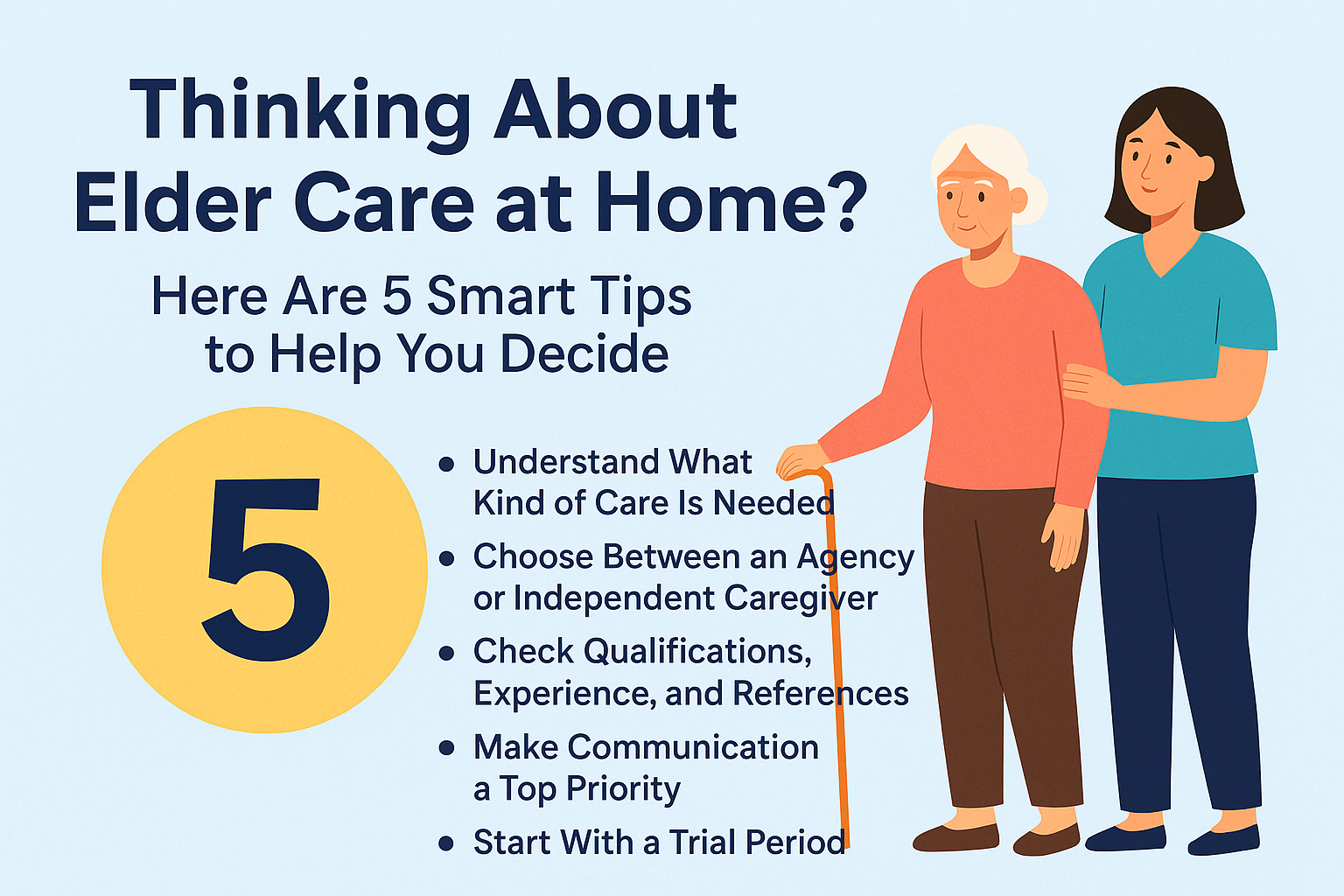Thinking About Elder Care at Home? Here Are 5 Smart Tips to Help You Decide
Introduction
Choosing elder care at home is a big decision—one that can bring peace, comfort, and dignity to your aging loved one. Whether it’s your parent, grandparent, or any elderly family member, you want to ensure they receive the best possible care in the comfort of their home.
But how do you know where to start? How do you avoid the regret of choosing the wrong person or service?
In this post, you’ll find 5 simple yet powerful tips that will help you confidently choose elder care at home that truly meets your family’s needs.
Understand What Kind of Care Is Needed
Before you even begin your search, it’s important to understand the level of care your loved one needs. Elder care at home can range from basic companionship to skilled medical support. For example:
Companionship and help with daily activities like bathing, dressing, or preparing meals.
Personal care services for someone who needs more help with mobility or hygiene.
Skilled nursing care for individuals recovering from surgery, living with chronic illness, or requiring medication management.
Make a list of your loved one’s needs. Ask questions like:
Can they manage their medications alone?
Do they need help moving around the house?
Are there signs of dementia or memory loss?
By clearly understanding these needs, you’ll know whether to look for a caregiver, a certified nursing assistant, or a registered nurse for elder care at home.
Choose Between an Agency or Independent Caregiver
Once you know what type of care is needed, your next decision is whether to go through a home care agency or hire an independent caregiver. Both options have pros and cons.
Agencies often provide:
Pre-screened, trained caregivers
Backup caregivers in case of absence
Help with legal and insurance matters
Independent caregivers can be more affordable and flexible, but you may need to:
Do background checks yourself
Handle scheduling and payments directly
Manage potential legal liabilities
If your situation is complex, going through a trusted agency for elder care at home might offer more peace of mind.
Check Qualifications, Experience, and References
This might sound obvious, but you’d be surprised how often families skip this step. Whether you’re working with an agency or hiring privately, always:
Ask about qualifications and certifications
Check experience with specific conditions (like dementia, stroke recovery, etc.)
Request references and follow up with phone calls
Ask former clients what they liked and didn’t like about the caregiver or service. You’re trusting this person with your loved one’s health and safety—don’t be afraid to dig deep.
And remember, the best elder care at home goes beyond technical skills. Compassion, patience, and respect are just as important.
Make Communication a Top Priority
Even the most experienced caregiver can’t succeed if communication breaks down. You need to make sure:
Your caregiver understands your loved one’s preferences
There’s a clear way to share updates or concerns
Everyone is on the same page about schedules, medications, and emergency procedures
Set regular check-ins, either in person or by phone, to review how things are going. Ask the caregiver to keep a daily log of activities, meals, and any noticeable changes in health or mood.
Clear communication helps you stay involved in your loved one’s care without micromanaging. It also helps build trust between all parties involved in elder care at home.
Start With a Trial Period
No matter how perfect someone seems on paper, it’s smart to begin with a trial period. This could be a few days or weeks where the caregiver provides part-time support. During this time, observe:
How your loved one feels around the caregiver
How the caregiver handles daily routines
Whether there’s a good balance of warmth and professionalism
Talk to your loved one often. Do they feel respected and safe? Is the caregiver attentive to their emotional needs as well as physical ones?
Starting with a trial helps you test the waters before making a long-term commitment to elder care at home.
Why Elder Care at Home Matters More Than Ever
With the rising costs of senior living facilities and hospitals, more families are choosing elder care at home as a cost-effective, compassionate solution. It allows seniors to stay in familiar surroundings, maintain routines, and enjoy a greater sense of independence.
Home-based elder care also offers families more control over who provides the care and how it’s delivered. You can tailor the services exactly to your loved one’s needs.
But the key is preparation. By following the tips above, you’re not only preventing mistakes—you’re building a plan that supports dignity, safety, and peace of mind.
Elder Care at Home: A Loving Choice
At its heart, elder care at home is about honoring the lives of those who raised us. It’s not just about medical checkups or clean sheets. It’s about presence, comfort, and respect.
Taking the time to choose the right care provider will make all the difference—not just for your loved one, but for your whole family.



